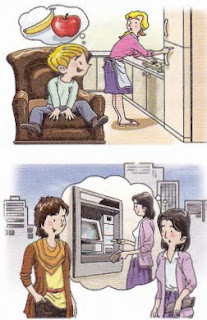가: 엄마, 과일 좀 있어요?
Mom, is there any fruit?
나: 응, 냉장고에 있으니까 꺼내다가 먹어.
Yeah, (it’s) in the refrigerator, so get some (out) and eat it.
가: 은행에 가요?
Are you going to the bank?
나: 네, 돈을 좀 찾아다가 하숙비를 내려고 해요.
Yeah, I plan to withdraw some money and (then) pay for my room and board.
This expression indicates that the action in the following clause is done based on the result of first completing the action in the preceding clause. Moreover, it also indicates that the speaker performed the second action in a different location than that of the first action. The shortened form -아/어다 can also be used.
 • 어제 시장에서 만두를 사다가 먹었습니다.
• 어제 시장에서 만두를 사다가 먹었습니다.
Yesterday, l bought dumplings at the market and then ate them (somewhere else).
• 과자를 만들어다가 학교 친구들이랑 같이 먹었어요.
I made some sweets and then (later, at a different place) ate them with my friends from school.
• 영미야, 부엌에서 쟁반 좀 가져다 줄래?
Yeoungmi, would you mind bringing (and then giving me) a tray from the kitchen?
-아/어다가 cannot be used in the past and future tenses.
• 남은 음식을 포장했다가 집에서 먹었어요. (X)
남은음식을 포장하겠다가 집에서 먹었어요. (X)
->남은 음식을 포장해다가 집에서 먹었어요. (O)
The form -아/어다 주다 is used when making a request to someone, but note that this form is different in meaning than -아/어 주다, which looks similar.

>> You can click on the title of each grammar below to learn about the other grammar which also expresses ‘Time and Sequential Behavior’:
01 만에
02 -아/어 가지고
03 -아/어다가
04 -고서
>> Full of Intermediate grammar: Click here

